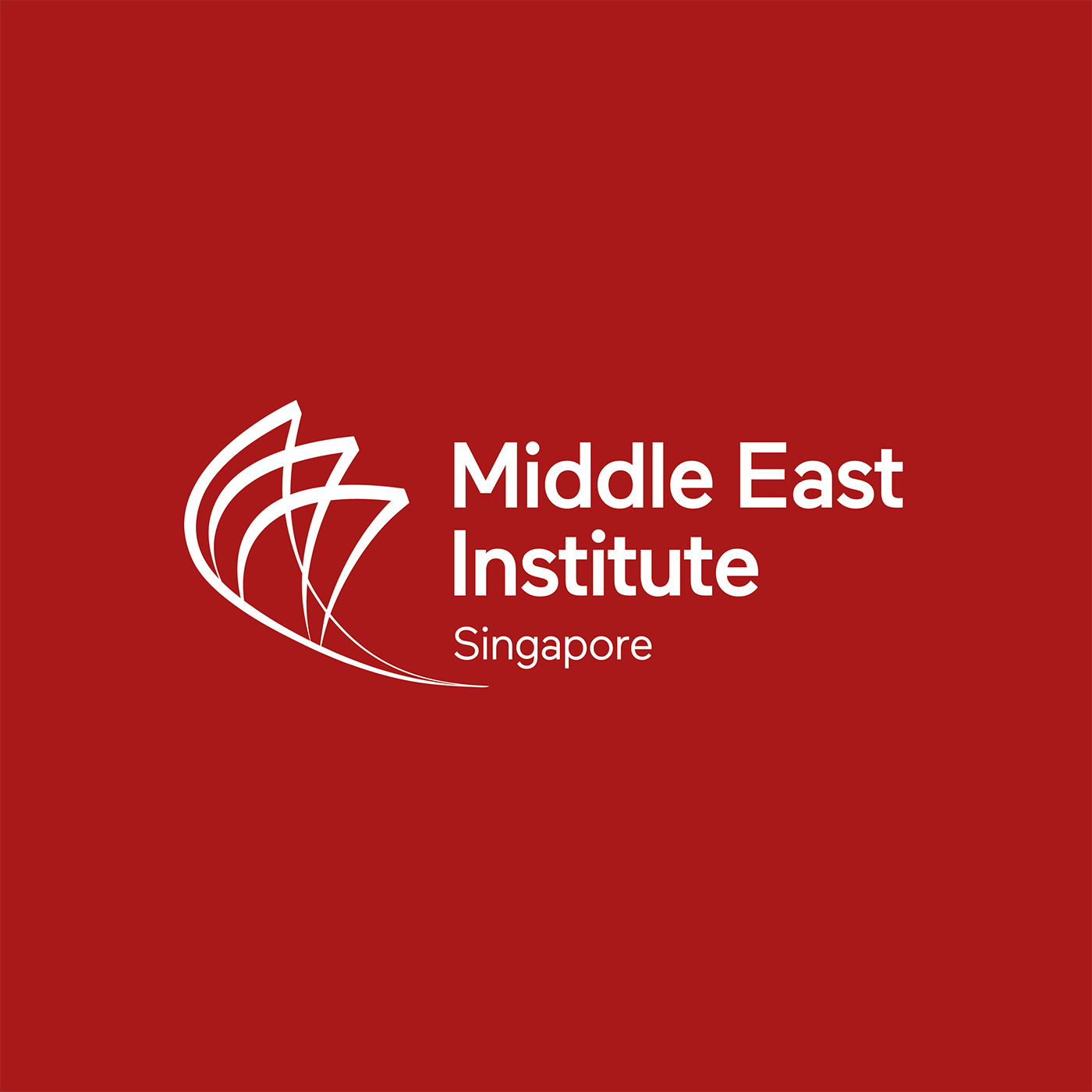Episodes
![Bridging The Gulf [Episode 11]: Scoring Opportunity: Sport in the Gulf’s Soft Power Armoury](https://pbcdn1.podbean.com/imglogo/ep-logo/pbblog4563756/BTG_11_oil_event_titlea293h_300x300.png)
Friday Nov 12, 2021
Friday Nov 12, 2021
Speaker: Simon Chadwick, Global Professor of Eurasian Sport, Emlyon Business School, Paris
Simon Chadwick is Global Professor of Eurasian Sport at Emlyon Business School in Paris. He also directs the school’s Centre for the Eurasian Sport Industry (CESI), based in Shanghai. He previously founded and directed the University of London’s Birkbeck Sports Business Centre, and Coventry University’s Centre for the International Business of Sport. In addition, he has worked at several of the world’s most prestigious business schools, including IESE in Spain, Otto Beisheim in Germany, Tsinghua in China and COPPEAD in Brazil. Professor Chadwick has held various positions across Asia and has direct experience of working in the Middle East. His research, writing, consultancy and teaching focuses on the geopolitical economy of sport.
![[Boots Off the Ground: Security in Transition in the Middle East and Beyond] Episode 20: The Evolution of Russian Private Military Companies from Syria to Mali](https://pbcdn1.podbean.com/imglogo/ep-logo/pbblog4563756/BOTG-LOGOArtboard-1-Edited-700x461_300x300.png)
Monday Nov 15, 2021
Monday Nov 15, 2021
In this episode, Dr Sergey Sukhankin discusses the evolution of Russian hybrid warfare and the role of Russian private military companies in the Middle East and Africa.
This podcast series is presented by Dr Alessandro Arduino, Principal Research Fellow and Dr Ameem Lutfi, Research Fellow, at the Middle East Institute, National University of Singapore.
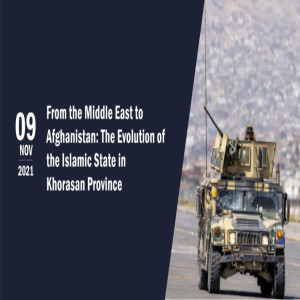
Monday Nov 15, 2021
Monday Nov 15, 2021
Dr Antonio Giustozzi, author of the books The Taliban at War and The Islamic State in Khorasan, will discuss the role of the Islamic State in Afghanistan, following the fall of Kabul. Alongside him will be Raffaello Pantucci, a researcher at RSIS whose work looks at security dynamics in the Eurasian heartland.
Their discussion maps the evolution of the Islamic State’s footprint from Syria to Afghanistan and its current relationship with the Taliban. Will future Islamic State – Khorasan Province (ISKP) attacks, similar to the recent one that happened at Kabul International Airport taking the lives of hundreds of Afghans and 13 US servicemen, complicate Taliban efforts to demonstrate its control of Afghanistan? Will ISKP launch an assassination campaign to eliminate high-level Taliban cadres with the same tactics previously used by the Taliban themselves when they attacked Afghan government officials? Will the Taliban seek greater co-operation with the West and/or other external powers to target ISKP? Also, will greater engagement with outside powers, including China, promote dissatisfaction within Taliban ranks that will in turn increase the ISKP’s recruitment?
Moderated by Dr Alessandro Arduino, Principal Research Fellow, MEI (NUS), Dr Giustozzi and Mr Pantucci explores these questions and look at the future of Eurasia security architecture, post-US and NATO withdrawals from the region.
This public talk was conducted online via Zoom on Tuesday, 9 November 2021, from 5.00 pm to 6.30 pm (SGT).
For more information about this event, click here: https://mei.nus.edu.sg/event/from-the-middle-east-to-afghanistan-the-evolution-of-the-islamic-state-in-khorasan-province/
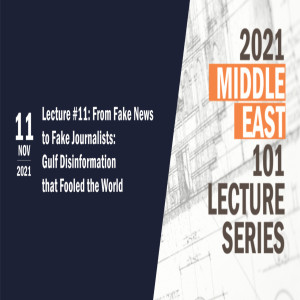
Monday Nov 15, 2021
Monday Nov 15, 2021
Lecture #11: From Fake News to Fake Journalists: Gulf Disinformation that Fooled the World
by Dr Marc Owen Jones [Thursday, 11 November 2021]
For more information about the 2021 ME 101 Lecture Series, click here: https://mei.nus.edu.sg/event/me-101-lecture-series-2021/
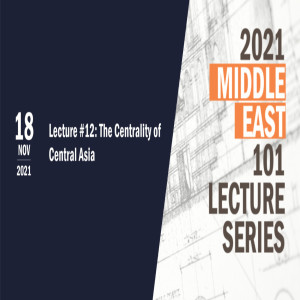
Monday Nov 22, 2021
ME 101 Lecture #12: The Centrality of Central Asia
Monday Nov 22, 2021
Monday Nov 22, 2021
ME 101 Lecture #12: The Centrality of Central Asia
by Dr Alessandro Arduino [Thursday, 18 November 2021]
For more information about the ME 101 Lecture Series, click here: https://mei.nus.edu.sg/event/me-101-lecture-series-2021/
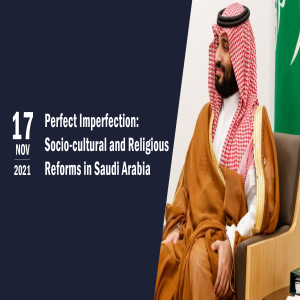
Wednesday Nov 24, 2021
Perfect Imperfection: Socio-cultural and Religious Reforms in Saudi Arabia
Wednesday Nov 24, 2021
Wednesday Nov 24, 2021
Five years since then-Deputy Crown Prince Mohammed bin Salman (MBS) unveiled Vision 2030, reforms continue to be rolled out in Saudi Arabia. Early this year, for example, it announced new judicial reforms that set it on a course towards codified law – a major step for a country whose legal system is based on Islamic law. While such reforms are aimed at boosting the liberalisation drive by softening the nation’s austere image, jarring contradictions remain. Women’s rights, for instance, remain a target of criticism – a recent article in The Washington Post revealed clandestine shelters that incarcerate “disobedient” women. This raises several questions: Is social change for real? What is the price of change?
Social change is but one aspect of MBS’ vision. Religion is another target. The crown prince has said that Wahhabism is akin to “deifying human beings”. This follows his championing of “moderate Islam” reining in the clerical class and resetting the role of religion in the state. How successful has this religious re-orientation been? What are the implications for Riyadh’s role as the gatekeeper of the global Muslim community?
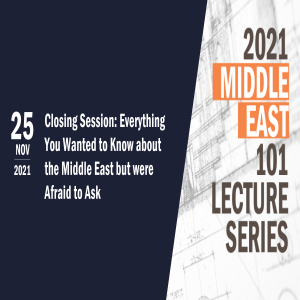
Monday Dec 06, 2021
Monday Dec 06, 2021
ME 101 Closing Session
by Mr Bilahari Kausikan [Thursday, 25 November 2021]
For more information about the ME 101 Lecture Series, click here: https://mei.nus.edu.sg/event/me-101-lecture-series-2021/
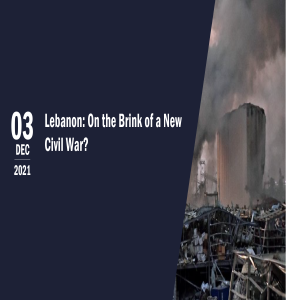
Monday Dec 06, 2021
Lebanon: On the Brink of a New Civil War?
Monday Dec 06, 2021
Monday Dec 06, 2021
For a few years after the Arab revolutions of 2011, Lebanon appeared like a paradox – the historically fragile state of the Middle East that used to be the buffer zone for regional competition had been relatively immune to the turmoil that other countries like Syria or Egypt, were facing. The assumption was that the people of Lebanon still had vivid memories of a 15-year civil war and scars from it were visible on Beirut buildings. However, since 2019, the country has faced a financial crisis that the World Bank ranks among the three worst in the last two centuries. The fall of the Lebanese currency threw many citizens under the poverty threshold. This economic collapse was enabled and aggravated by the inability of the political elite to satisfy the demands of international organisations and governments involved in the recovery plan. Furthermore, the massive explosion at Beirut Port in August 2020 also crystallised the deep divides between political factions, reminiscent of the civil war’s era.
In this context, the panel will explore the drivers of the ongoing Lebanese crisis, the consequences for the country and for the region as well. It will tackle the question of sectarian politics in Lebanon and the influence of Hizballah in the current situation, alongside identifying the role of external powers in preventing the collapse of Lebanon.
![[Boots Off the Ground: Security in Transition in the Middle East and Beyond] Episode 21: Bellingcat and Open-source Intelligence](https://pbcdn1.podbean.com/imglogo/ep-logo/pbblog4563756/BOTG-LOGOArtboard-1-Edited-700x461_300x300.png)
Wednesday Dec 15, 2021
Wednesday Dec 15, 2021
In this episode, Mr Eliot Higgins discusses the weapons used in the conflict in Syria and open-source investigation tools and techniques.
This podcast series is presented by Dr Alessandro Arduino, Principal Research Fellow and Dr Ameem Lutfi, Research Fellow, at the Middle East Institute, National University of Singapore.
![[Book Discussion] Three Dangerous Men: Russia, China, Iran and the Rise of Irregular Warfare](https://pbcdn1.podbean.com/imglogo/ep-logo/pbblog4563756/Dec8_TITLE_YT_300x300.jpg)
Thursday Dec 16, 2021
Thursday Dec 16, 2021
The book examines how three key figures in Moscow, Beijing and Tehran, built irregular warfare campaigns that are eroding American power. Conventional warfare—clashes between large military forces—defined 20th century power. However, today, facing dominant US conventional and nuclear capabilities, America’s principal adversaries (Russia, China and Iran) have adopted a different style of competition. Ranging from cyberattacks, covert action and proxy conflicts to information and disinformation campaigns, espionage and economic coercion—these are the tools of irregular warfare which will increasingly re-shape international politics. In short, the future of warfare is likely to be closer to the Chinese general Sun Tzu than to Prussian military theorist Carl von Clausewitz.
This public talk was conducted online via Zoom on Wednesday, 8 December 2021, from 8.00 pm to 9.30 pm (SGT).
For more information about this event, click here: https://mei.nus.edu.sg/event/book-discussion-three-dangerous-men-russia-china-iran-and-the-rise-of-irregular-warfare/

